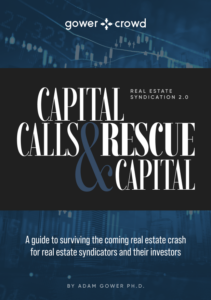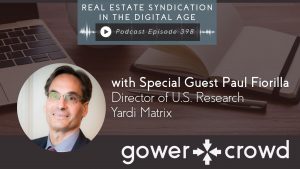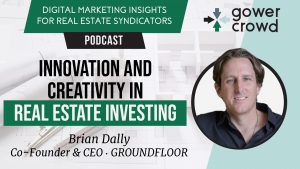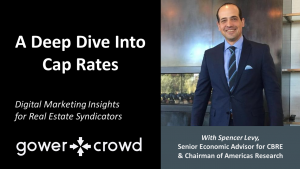Mark Roderick, Attorney
The Lawyer's View of Real Estate Crowdfunding

Mark is the foremost attorney specializing in real estate crowdfunding in America.
He was among the pioneers who saw the connection between the JOBS Act of 2012, intended as it was for small businesses, and real estate.
Understanding that the ability for real estate sponsors to advertise their projects online in order to raise capital, Mark saw a new industry was about to emerge, bringing together digital marketing and real estate capital formation..
See below for more links to Mark's online profiles.
What You're Going to Learn
* That you CAN syndicate real estate online - and why
* How to raise money from anyone, anywhere, anytime
* Real estate is crowdfunding's success story
* How to raise $14 million online
* How to build trust through authenticity
* The future of real estate crowdfunding
* The risks and opportunities to watch for
And much, much more.
Listen To or Watch the Full Podcast Here
Show Highlights
How to Use the Internet to Legally Raise Money for Real Estate
Adam: Tell me a little bit about the story of how you came to this and how it occurred to you that this was a marketing opportunity.
Mark: I have been practicing law since roughly 1840, as I always say, and in the course of practicing law, what I have always done is represented entrepreneurs in everything they do. One thing entrepreneurs spend a lot of time doing is trying to raise capital, because every entrepreneur needs capital. That's why they call it capitalism, because capital is what runs the machine.
I have been involved in helping entrepreneurs raise capital since forever, and when I saw the JOBS Act on the horizon, I said to myself, "Wow. We will be able to advertise." What that means is that the internet is coming to the capital-formation industry. That was the observation. I don't even want to call it insight.
By that time, the internet had already come to a number of industries; retail, as an example; the travel industry; the book-selling industry; all these industries. When the internet comes to an industry, it always does the same thing in an industry-specific context. It always directly connects buyers and sellers, over the head, and displacing all the middlemen.
If you think about what you and I both know about what the capital-formation industry used to be - that series of disconnected networks - those are all middlemen. I say that in Manhattan, from the East River to the Hudson, that's just middlemen; all those people are just middlemen.
Knowing what the internet has done to all these other industries, I said to myself, "Wow, that ... I mean, books? Yeah, that's a big industry, but capital formation, that is a multi-trillion-dollar-a-year industry. When the internet hits that industry, you are going to see some real disruption." That's when I decided that I'd really like to get into this business. Then it immediately became apparent that there's a billion websites out there, probably more. I don't know, there's probably 100,000 more every day.
A lot of them have really cool stuff on them; really interesting stuff. I said a few seconds ago, you could put up a website today to raise money for a business, but man, you are competing with a billion websites. A lot of those websites, I'm sorry, but they have photos of really attractive people [cross talk] ... You've got to compete with that.
That's when I realized, now, we've gone from a world of only being able to talk to six people to raise money ... Now, we're going to be able to talk to a world of 6 billion people. How is my voice going to be heard in all that commotion? That's when I started to say and must have said thousands of times since - crowdfunding is a marketing business.
How to Raise $14 Million Online
Adam: Although it has outstripped other industries, it still has an enormous way to go. One of the things that you mentioned was that is that taking marketing online is something very, very different. My question to you is: is it really? Is it actually something really very different?
Mark: You know what? That is a question that I would turn around and ask you, because ... I'm serious, because as I always tell people, I am just a boring corporate-securities lawyer. The value lies in the marketing. I will ask you - is marketing a real-estate apartment building in Austin online, is that different than marketing soap? How is it different?
Adam: Well, it's not ... In terms of marketing soap, it's ... What I meant was it's actually the exact same as marketing the old way, only it's done online. The same process has to be engaged.
If I'm meeting you for the first time, and I've got a deal at Walk and Crosswalk, the first thing we're going to talk about is who am I, who are you? We'll get to know each other. We might have lunch together - the old way. Over time, you'll get to know me, and you'll come to like me and eventually trust me enough to send me a check for the deal, if the numbers make sense.
Online, it's the exact same thing. You still have to establish a relationship with a prospect. You just do it's in a different way - online. That's really the fundamental difference.
What I was interested to know is what have you seen, in terms of your clients who have adopted this? For example, your client that raised $14 million, I'm assuming that they used digital marketing in some way. They went online and they did it.
What was it for them, in your experience, or for other clients that you have that has enabled that mindset to go from the old way, the traditional way, to adopting that you use your phone, basically, now to communicate. What makes [cross talk]
Mark: This client, and this kind of right fits in with what you said ... One, they raised the money through one of the marketplaces, CrowdStreet. CrowdStreet, as you know, has a large pool of online investors, but this $14 million raise was their third offering on CrowdStreet.
Maybe what's happening there ... You talked about you and I meeting, going out to lunch. Maybe what has happened is that sponsor has formed a relationship, essentially, with these investors. Things went well in the first deal. Things went well in the second deal. By the time he got to the third deal, investors were just saying, "Where do I sign."
Then, of course, there's this weird herd mentality that I think has always been there in the investment community; everyone wants to jump on something that they see other people jumping on. I think you're seeing some of that now in the online-investing platform.
For example, the situation you just said- you said they raised either $3 million in 5 minutes, or $5 million in three minutes [cross talk] In either case, those investors were not, during those precious few minutes, carefully analyzing the deal, and looking at the pro forma, and just speed-reading ... They were engaged in some other kind of psychological behavior. I guess when you're marketing these deals, that's the behavior that you're trying to stimulate.
You Can Syndicate Real Estate Online. Here's Why.
Adam: Mark, you really inspired me. We spoke at least a couple of years ago, and you shared with me an incredible insight that the changes in regulations allowing real-estate sponsors to raise money online was a marketing opportunity. I really want to talk to you about that. That's what I'm doing now. I provide ... You asked me, I provide marketing, digital marketing, and social-media services to sponsors to raise capital.
Before we get into that, let me ask you one question, and let's address our conversation to those in our audience who still don't know you can do it. Is it legal, first of all, to raise capital online, and if so, tell me the story of how that came to be?
Mark: No, it's not legal at all. What's your next question?
Adam: What are you doing for lunch? That's all right. We'll cancel now.
Mark: Okay. My answer is going to go back many years into American history, but then it's going to really quickly come back up to date, so don't think I'm going to go month to month. We had a Great (world) Depression, back in the 1920s, as everyone knows, I believe ... Actually, you know, I don't know whether people younger than me do know-
Adam: You were there, of course, right?
Mark: My grandparents lived through it, so I am maybe the last generation that actually remembers we had a Great Depression; not just in this country but all over the world. It led to the rise of Nazi Germany and all kinds of bad things.
One of the causes of the Great Depression in this country was that American capital markets had become basically a swamp filled with investor fraud, and stock-market manipulation, and so on, and so forth. When you live in a capitalist country, as we do, and your capital markets collapse, you have a depression.
As I'm sure all your listeners know, Franklin Roosevelt was elected president for the first time in 1932. One of the very first things he did teaming up with a Texas Democrat named Sam Rayburn, who went on to an extremely illustrious career ... They teamed up and wrote the US securities laws, as we now know them.
It's not a coincidence that all of the securities laws that you read about today, you read on the internet. Well, what laws you know affect cryptocurrencies, these brand-new digital assets? People are always talking about the Securities Act of 1933, the Exchange Act of 1934, the Investment Company Act of 1940. It's not a coincidence that those laws were written at that time, because they were written in direct response to the collapse of our capital markets in the late 1920s.
The result is, in this country, we got the most stringent, transparent securities laws in the world. A result of that has been we- not coincidentally, we have the most efficient, most trusted, and most valuable capital markets in the world.
I go back into that history, to give your listeners - that person that you referred to who's not sure whether we can do all this - some sense of the history behind the rules. Ever since the 1930s, since the 1933 act, there have been a few fundamental rules about American securities laws. One of the most fundamental rules that every young securities lawyer learns at his mother's knee is that there is a difference between public offerings of securities and private offerings of securities.
The difference is, in a public offering, you can advertise a ... Oh, let's take an old-school company, General Motors, or a new-school company, Uber. Those companies can advertise their securities publicly. "Here, come buy our securities," they can say in The Wall Street Journal.
Conversely, a private company, a real-estate developer buying an apartment building in Austin, for example, could not advertise, and everyone knows that. Instead of advertising, that developer has to know people, or know people who know people, or know people who know people who know people. Very inefficient series of barely connected private networks, basically.
Now, I'm finally going to answer your question. It is that longstanding rule that was changed in 2012, when then President Barack Obama signed into law the JOBS Act of 2012 on, I believe, May 5th, 2012. Although there's lots of complicated rules included in that law, the single thing that transformed the capital-formation industry is a reversal of that 85-year-old rule.
Whereas you could not advertise before the JOBS Act, after the JOBS Act, you can advertise virtually any way you want. In fact, when I'm ... I do a lot of public speaking, and I'll be moderating a panel of lawyers, and I will say, "What kind of advertising can you not do under Rule 506(c)?" People get a little bit of a worried expression on their face, like, "Don't ask me ..." It's a trick question, because there is no advertising that you cannot do under rule 506(c).
I've probably been talking long enough, but you said, "How do you go about doing it?" As you know, there are three kinds of crowdfunding, and we can talk about those if you want to, but they all have in common the reversal of this longstanding rule. You can now advertise your private deal publicly.
Related to this episode:

How to Raise Capital Online - Home Builder's Association Presentation














